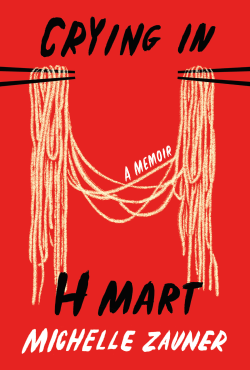
You’ll likely find me crying by the banchan refrigerators, remembering the taste of my mom’s soy-sauce eggs and cold radish soup. Or in the freezer section, holding a stack of dumpling skins, thinking of all the hours that Mom and I spent at the kitchen table folding minced pork and chives into the thin dough. Sobbing near the dry goods, asking myself, “Am I even Korean anymore if there’s no one left in my life to call and ask which brand of seaweed we used to buy?”
Zauner's mother, Chongmi, died of cancer, sending Zauner in a spiral of grief. The memoir reconstructs their relationship, often in terms of Korean food.
The depictions of cancer in this book are rough, even for a book about someone who died of cancer. Her mother did not have a good death - again, even in the context of death generally not being great - and the horrible way she died is a big part of Zauner's grief. As her father is white and some of her Korean family had already died of cancer, when her mother is dead Zauner struggles with the loss of heritage and culture, as well as the loss of her mother.
Their relationship is intense. Some of the things her mother does to her, especially in childhood, are abusive in my opinion, like kicking her when she hurts herself falling out of a tree. At other times, her mother is extremely loving and considerate, like wearing a pair of gift boots around the house for a week to break them in for her. Her mother keeps saying Zauner was a difficult child, but... she was a child! It sounded like Zauner, an only child in an isolated setting, was incredibly driven to please her mother, who was not easy to please. She rebels when she's a teenager and they have a big break for a while. Zauner creates a band, Japanese Breakfast, and gets a boyfriend... and then she gets the cancer call.
A memoir of grief, family, and food by a Korean-American musician sounded so exactly up my alley, and I loved the first chapter (originally a New Yorker essay) so much, that I was surprised to not love the rest of the book anywhere near as much. There were individual parts that were great, but as a whole, it never quite cohered for me.
It's hard to put my finger on exactly why. There were times when I wished she'd dig deeper into what was going on rather than simply reporting it (but there's plenty of books I love that report rather than dig deep), and the structure felt a bit scattered (but there's other books I love that also skip around in time). I kept thinking, "Wait, what about such-and-such? Is that seemingly really important thing ever going to get explored?" She marries her boyfriend because her mother wanted to see them married before she died; a family friend makes her dying mother convert to Christianity; her music career happens kind of around the edges. I finished the book thinking that she'd undoubtedly gotten divorced and her band was extremely obscure, only to look them up and discover that she's still married and the band is HUGE.
Crying in H Mart got overwhelming critical and popular acclaim, and really resonated for a whole lot of people. Maybe because I'm not a biracial Asian-American, I didn't relate to the specific intergenerational and cultural issues, but on the other hand I loved the first chapter which also was about those issues. For whatever reason, it wasn't a book for me, but that's not a critique of the book. It's obviously a book that resonated a lot with many. You will probably like it more than I did.
Where it really succeeded for me was in making me crave Korean food. I've had it twice since reading the book, and am planning a visit to the nearest H Mart.